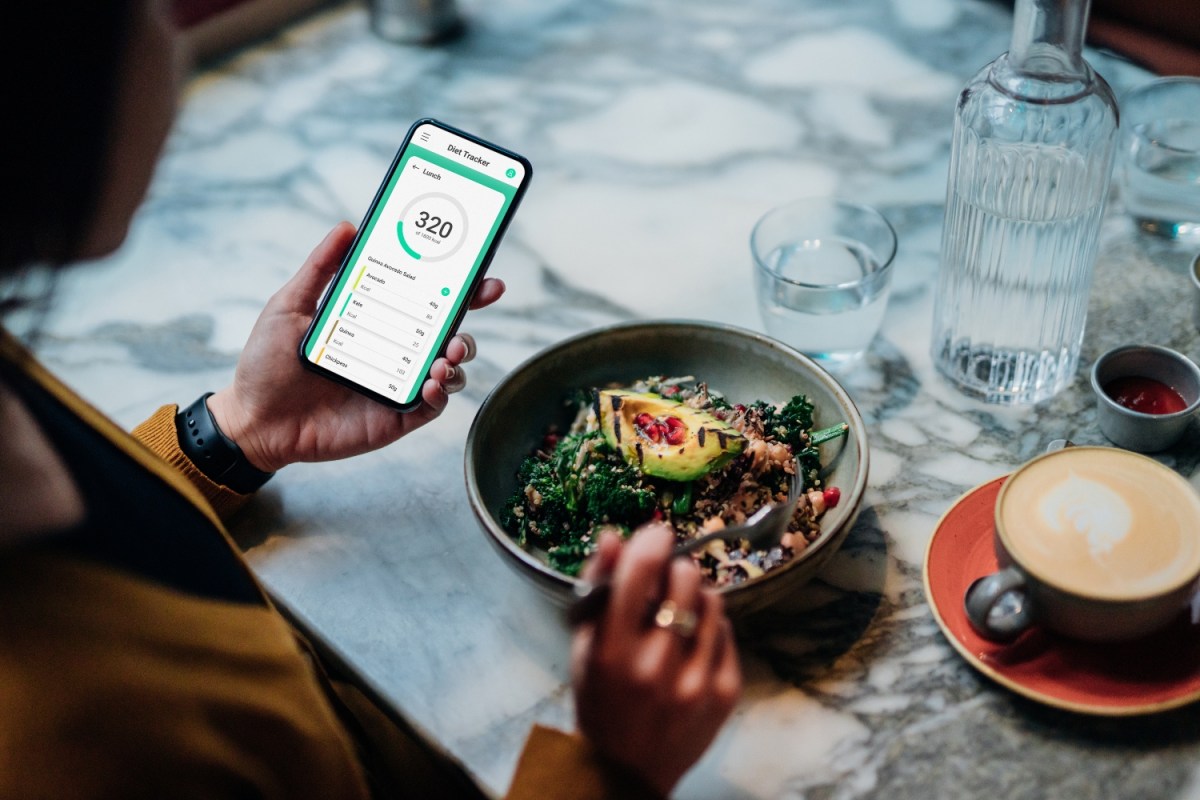Like most people with internet access, I am aware of Noom. Ads for the app-based weight loss program have become ubiquitous in recent years, and the platform’s “wellness”-focused approach signals that Noom is the weight loss trend of the moment: a not-diet diet for the anti-diet era.
Over the past week or so, however, seemingly overnight, the internet’s tune on Noom appears to have shifted dramatically. “Every noom ad is like ‘we’re NOT a diet. we’re an eating disorder :)” reads a tweet from Tuesday, which, at time of writing, has accumulated more than 136,000 likes and 10,000 retweets. A mounting Noom pile-on has followed, with users slamming the program’s rigid calorie restrictions and blaming the app for fueling disordered eating behaviors and yo-yo dieting, just like the old-school diets Noom promised not to be.
Suddenly, everyone is mad at the former it-diet of the moment, apparently because they just found out that it is, in fact, a diet. Beneath all the trendy, “science-backed” appeals to weight loss by way of psychology, it turns out Noom relies on the same old calorie counting and food restriction that have always defined the traditional diets from which Noom tries to differentiate itself.
Perhaps it’s because I’ve been tracking my calories since I could count, but I wasn’t particularly shocked to learn that the not-diet diet is a diet. While I’ve never used Noom, and until recently knew little to nothing about its methodology, I always assumed it was exactly what everyone is apparently so surprised to learn it is: a diet, or whatever you want to call a weight-loss program, thinly veiled in language more permissible in our current era of body positivity and anti-fatphobia.
It is no longer trendy, or really even acceptable, to be on a “diet.” If you are, you’re perpetuating “diet culture,” the root of all manner of social ills including eating disorders and fatphobia. Dieting is for regressive bimbos desperate to appease the male gaze by making their bodies smaller. Men get off a bit easier of course, perhaps in part because men were never really encouraged to “diet” to begin with, thanks to the term’s “feminine” connotations. But anyone of any gender caught trying to calorie-restrict their way into a smaller body these days can and will be held accountable for their internalized fatphobia.
As someone with a long history of disordered eating, I’m certainly not ignorant of the very real dangers of fatphobia and diet culture on both individual and societal levels. The first time I wanted to go on a diet, I was four years old. Someone had left me unattended in front of the TV one day when my Saturday morning children’s programming transitioned into an infomercial for some early-2000s diet or other. I watched the entire hour, mesmerized. I couldn’t wait to be old enough to go on a diet. I couldn’t wait to be skinny. Twenty years and a lifetime of disordered eating later, and I certainly can’t argue that diet culture doesn’t exist and isn’t dangerous.
The problem is, however, people still want to lose weight. Fat people want to lose weight; thin people want to lose weight. Thin people who have gotten fat want to lose weight and fat people who have gotten thin want to lose more weight. I’m not saying everyone necessarily wants to lose weight. I do have faith that those seemingly mythological creatures who have made peace with their bodies and never think about their weight do in fact exist. I’m just not one of them, and neither, I would argue, are most people.
So if we still want to lose weight and weight loss companies still want to make money, we’ll just change the names and invent a new vocabulary for it. It’s not a “diet,” it’s a “health and wellness tool,” as Noom president Artem Petkov told BuzzFeed News. Even too-explicit mentions of “weight”or “weight loss” have become something of a taboo. Weight Watchers rebranded as WW back in 2018, which is sometimes said to stand for “WellnessWins” but mostly just stands for “please don’t think about what this stands for.” Like Noom, WW has also faced accusations of peddling the same old diet tactics under new branding, which is obviously exactly what it’s doing, because what else can it do?
Calling a diet something other than a diet is nothing new, of course. Dieting, particularly of the “crash” or “yo-yo” varieties, has always carried some negative connotations. In the past, people attempted to fend off accusations of crash dieting or otherwise unhealthy weight loss behaviors by referring to their diets as a “lifestyle change.” My mother, who probably wouldn’t have minded if I’d been a bit thinner as a child but certainly didn’t want me to have the eating disorder I eventually developed, has always been a big advocate for “everything in moderation.” Of course, her version of “moderation” was never eating more than half her food. To this day, I have never seen my mother eat more than half of anything, be it a cookie or a meal. To be fair, I’ve also never seen her above 110 pounds, so maybe she’s onto something.
Whatever we call it, whether it’s “moderation” or “a subscription-based app for tracking a person’s food intake and exercise habits,” we’re still doing exactly the same thing we were doing back when women’s magazines preached cottage cheese diets instead of self-love. The main difference now is that while dieters of yore may have been accused of practicing unhealthy behaviors (bullying women into having eating disorders and then shaming them for having those eating disorders was the great American pastime of the ‘90s and 2000s), anyone caught trying to lose weight today is not just harming themselves, but society as a whole. If you’re trying to lose weight, you are part of the problem. Your unchecked fatphobia is feeding the diet industrial complex and fueling the many social ills for which it is responsible, directly destroying other lives. If you want to lose weight, you’re a victim of your own un-interrogated anti-fatness, and you’re dragging everyone else down with you.
I don’t even necessarily think that these accusations are fundamentally false. I do believe the vast majority of weight loss is probably rooted, to some extent, in the fear and hatred of fatness. If you’re trying to get thinner, it’s probably because you don’t want to be fat, right? And why don’t you want to be fat? I think most of us know the answer, whether we want to admit it or not.
I don’t, however, think that it’s really anyone’s fault if they still want to lose weight, nor do I think shaming people for their weight loss goals is particularly fair or productive. For all the apparent progress we’ve made towards a more body-positive, less fatphobic world, society still hasn’t quite caught up. I’m not saying nothing has changed or ever will, but progress is slow. At its core, however rotten it may be, our society remains a deeply fatphobic one that rewards thinness and punishes its opposite. As Sarah Miller wrote for the New York Times in 2020, “I am not saying that no one has accepted her body, that it’s all a lie. I am just saying that I’m pretty sure we haven’t ‘arrived’ anywhere.” Perhaps someday we will arrive, but in the meantime, what are people who still want to lose weight supposed to do?
Maybe it’s because, as a thin woman who wants to be thinner and in all likelihood always will, I’m part of the problem, but I find it hard to blame people for wanting to be thin in a society that still so obviously and immediately rewards thinness. Perhaps bullying people out of that desire is the only way to change the culture that fuels it, but it just doesn’t feel particularly fair nor effective to villainize the decisions someone makes about their own body, to hold those personal decisions responsible for a widespread societal ill.
I don’t know that we’ve really gained much in the fight against fatphobia by turning “diet” into a four-letter word. All we’ve done is encourage companies to lie to us — which they are always going to do anyway — and forced ourselves to perform some very complicated mental gymnastics in order to justify the completely normal desire to lose weight. Personally, I’ve always been pretty unapologetic about my own imperfect relationship to food and my body. I’ve learned not to complain about my weight in front of other people, and I would certainly never recommend my eating habits to anyone. But the way I see it, it’s my body, and whatever I choose to do with it is my choice to make.
I want to believe that there’s a way to lose weight without being fatphobic, that we’re all entitled to make decisions about our own bodies and that those decisions do not necessarily reflect the way we feel about other people’s bodies. I don’t know if there’s an easy answer to any of this. I don’t even necessarily know if I’m right about any of it. What I do know, however, is that existing in a body is extremely hard, and if existing in a smaller body is easier for you, I think that’s okay.
The Charge will help you move better, think clearer and stay in the game longer. Subscribe to our wellness newsletter today.
























